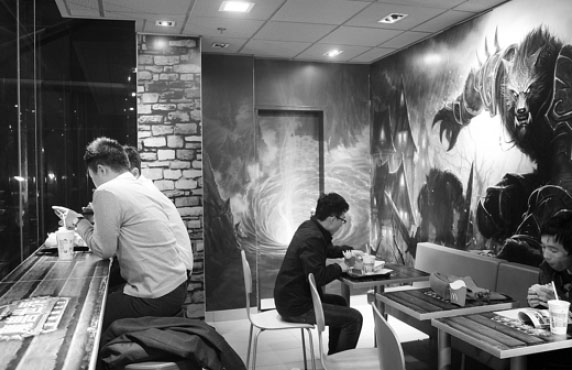Orcs and elves join McDonald's in fast-food war
McDonald's Corp is enlisting the orcs and elves of the World of Warcraft in its fight to win over Chinese consumers scared away by food safety scandals.
To entice younger customers, McDonald's designed Warcraft-themed outlets and gave away virtual items such as magic turtles tied to the popular online role-playing game, its first cooperation in China with a computer game.
The effort comes as the world's largest restaurant chain seeks to recover from a food scandal in July, when its main supplier in Shanghai was accused of selling expired meat, leading China sales to plunge 23 percent.
|
Diners at a McDonald's Warcraft-themed outlet in Shanghai. Gao'erqiang / China Daily |
The crisis embroiled Yum Brands' KFC and other eateries, forcing the chains to pull items off menus as they rushed to find alternative suppliers.
"I know of McDonald's supplier issues, but I wanted to try out the latest Warcraft game before its release," said 21-year-old Li Jialiang, a Warcraft fanatic who endured a 12-hour train ride from central Henan province to visit one of the themed restaurants in Shanghai.
As they waited by a row of laptops set up in the outlet to test the newest edition of the Activision Blizzard Inc game, Li and his friends bought a 69 yuan ($11.2) chicken box set that gave enough points to redeem an ice-conjuring monster pet.
In World of Warcraft, fantasy races such as orcs, elves and Pandarens, a race of panda-like humanoids, battle for glory.
While fast-food chains often hold promotions with popular Western games, movies and cartoon characters in the United States, such collaborations became common in China only in recent years.
The Warcraft marketing campaign helped McDonald's quadruple sales of its chicken box set, its China spokeswoman Regina Hui confirmed.
It started on Sept 24 and will run until year-end, and is not related to the July food safety incident, she said. The chain had previously held a promotion in China featuring Angry Birds, a mobile phone-based game.
McDonald's Japan unit, which sourced chicken nuggets from the same Chinese supplier and has forecast a full-year loss due to the case, also started sales of calendars featuring a popular cartoon called Yokai Watch on Nov 7, as part of efforts to draw families back after the incident, vice-president Row Imamura said at a briefing in Tokyo.
Jeff Walters, the Beijing-based managing director at the Boston Consulting Group, said that while cross-marketing with games can succeed in bringing in some diners, McDonald's needs to do more to regain trust.
"Getting customers back into the store is quite positive for them in the near term," Walters said. "Keeping them coming back in the long term will require consistently delighting them with the menu and promotions, as well as maintaining a positive food safety record."
McDonald's has taken steps including appointing a food safety chief for China and promising more surprise checks on suppliers as customers avoided its stores in the aftermath of the supplier scandal involving Shanghai Husi Food Co, a unit of OSI Group LLC.
Company executives predicted it would take as much as nine months for sales to recover.
For the Warcraft campaign, three Chinese outlets - in Beijing, Shanghai and Guangzhou - were decorated with wallpaper depicting scenes from World of Warcraft, while animation from the online game play on television screens.
On one weekend, enthusiasts were dressed up as characters from the game, including a lighting god in golden armor and white-haired wizards, who mingled with customers.
World of Warcraft had 6.8 million players globally as of June, making it the top subscription-based role-playing game, according to Santa Monica-based video game publisher Activision Blizzard, without breaking down subscribers by country. Beijing-based NetEase Inc has been licensed to operate the game in China since 2009.
China's online games revenue is poised to exceed 100 billion yuan this year and grow 26 percent each year to 2017 as more operators enter the market and introduce new products, industry analyst iResearch forecast in a report in April.
Sales in the country's fast food industry will grow 10 percent this year to 798 billion yuan, according to Euromonitor International. Yum, with outlets including KFC and Pizza Hut, is China's biggest operator with 5 percent market share, followed by McDonald's with 2.6 percent, according to the London-based research firm.
McDonald's wanted to tap the growing online gaming market where "two out of five Chinese are game players," said Shanghai-based Hui, adding the target audience for the chicken set "is very similar" with World of Warcraft's, mainly male students and working adults at ages between 15 and 35.



















